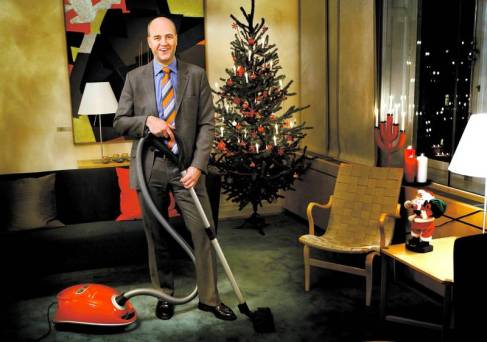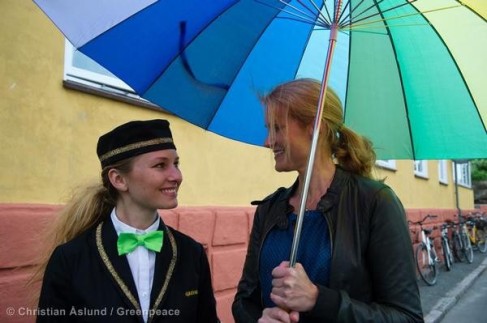Before Christmas, a proposal for the Swedish Centre Party’s new party programme went public. Loyal party members as well as media went bananas due to the distinct neoliberal tone. The ideas of free immigration, polygamy and flat tax were indeed quite new and provocative in a Swedish context. But the programme also challenged two sacred cows in Swedish politics – the old one of consensus and the current one of opinion polls.
The Winning Concept of Not Acting
One of the distinctions of Nordic politics is seeking consensus, where Sweden might be the most extreme example. The welfare state is closely associated to the idea of consensus, a tendency to avoid controversies and a will to show solidarity to your fellow man. Recently, a discussion on the back-side of consensus as the leading star in the political landscape has sparked. A flamboyant will for harmony and compromise can lead to a situation where many decisions are made behind closed doors, especially the tricky and controversial ones. In worst case, becoming patronizing in hiding the unpleasant truth.
The politics of the polls, when the core business of a political party is to follow the public opinion polls and form the political agenda thereafter, on the contrary, is a global phenomenon that has made a strong penetration in Sweden since the historical parliamentary election in 2006. It was the year when the centre-right Alliance for Sweden won and the Moderate Party took over the social democrat slogan worker’s party. Since then, all the parties have been moved towards the middle field, but the Left Party and Sweden Democrats. The recently chosen Social Democratic Party leader Stefan Löfvén has been talking about the importance of growth and wants to create a business plan for Sweden.
The trend has created “responsible” parties that ask the public opinion first and then acts. The every-week opinion polls have strengthened the trend and have made the politicians extremely careful in what they say and do. Together with the tradition of consensus, the politics of polls have created a situation where the best way for a politician to get re-elected is not to act. In case you really need to do something, do what the opinion polls show that you should do. Then suddenly this party wants to talk about ideas, new and bold ones.
Internal Birth Pains
Despite the fact that approximately 220 local party chapters and 10,000 individuals have been involved in drafting the programme, even the party itself is divided. A local chapter of the party has demanded to scrap the new proposal on open borders and warns that “Sweden will be overrun by illiterate clans”. Lööf cut short her holiday last week and went public on explaining the ideas. She declared that the programme is a long-term vision and cannot realistically be put in place even within the next ten years. An example of typical consensus-oriented politics of polls is the Centre Party MEP Kerstin Lundgren’s opinion piece that states the party should be something “green, libertarian and for fellowship, for sustainable development at home and globally”. Saying nothing and everything at the same time, hoping for maximum election turnout with utmost freedom to act and compromise. Snooze.
In the best of worlds, the new distinct liberal agenda will help the party to win in the long run. Twenty years ago, No one would have believed that the Green Party would become one of the most powerful parties in Sweden. They were perceived as a one issue party consisting of a bunch of ideologists that did not understand the big politics. Today it’s the other parties that have followed the Green Party ideas of a sustainable society. In the short run, though, the Centre Party might be close to committing a political suicide. According to the latest opinion polls, the Centre Party would not come in to the parliament if there was an election today. The voter sympathies are positioned under four percent, which is the minimum a party has to get. Annie Lööf, the party leader, is one of the least popular of the Swedish party leaders. But the harsh truth is that a rural party core voters with feet stuck deep in the agrarian soil will soon be an ex-party if the current demographic trend continues. The party has to find a way to build a bridge between the new refreshing ideas and the party’s humbling rural legacy of soft and societal values.
Looking Forward
The Swedish editorials have been carefully positive about the new party programme as an initiative that could vitalize the democracy through new ideas and modern political alternatives. Until today, no Swedish party has dared to challenge the Swedish Democrats with a totally opposite alternative of free immigration. Swedish politics need a party that is looking forward; not backwards, not just living in the moment and by the means of current polls, but seeing the challenges and possibilities of the future. As one of the leading political columnists wrote recently, there’s a good chance that history will show that the Centre Party was right. Although the party itself might be history when that day comes. In the middle of February the party board will publish their version of the programme and the party convent will decide the final version in March. Northernwille will follow the debate with a great interest. It was long time ago the Swedish politics was as exciting and rich of new ideas as now.









